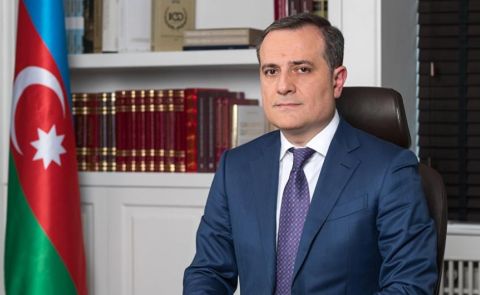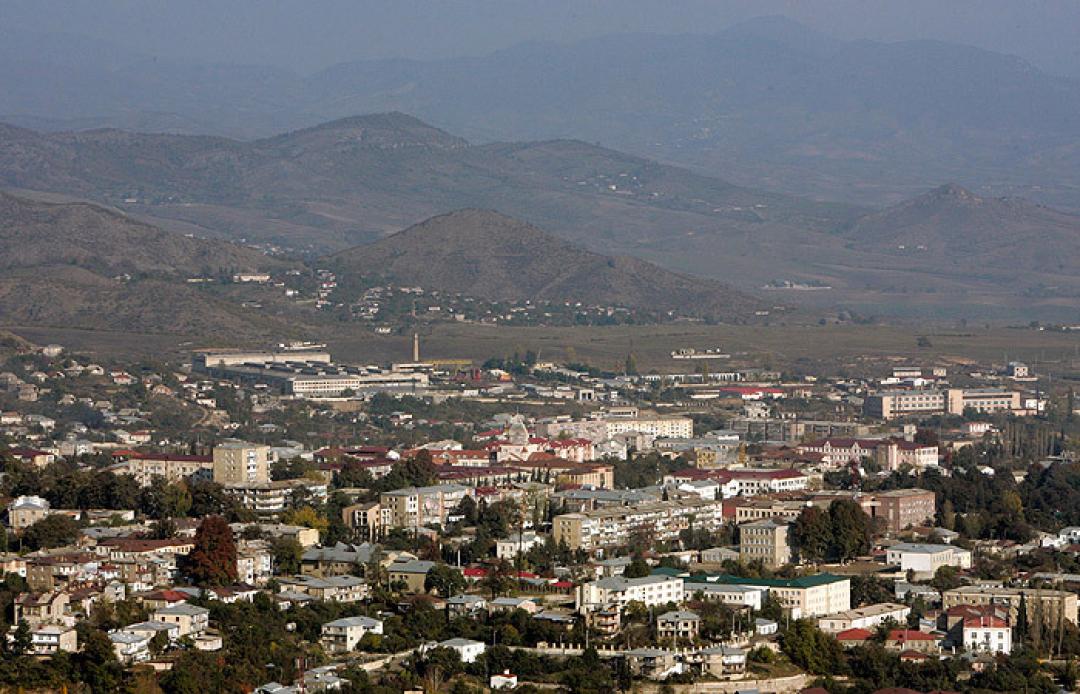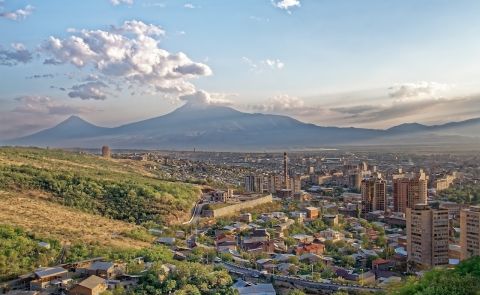
Exchange of statements between Armenia and Azerbaijan regarding Nagorno-Karabakh conflict

Ararat Mirzoyan: “Nagorno-Karabakh is not just a piece of territory, but people whose dignity must be respected”
The 132nd Ministerial Session of the Council of Europe was held in Turin, Italy with the participation of Armenian Foreign Minister Ararat Mirzoyan, who in his speech noted the important role of the Council of Europe in helping countries build strong democratic institutions and stressed that today "we are witnessing an impending decline security architecture," which did not just start in the last few months.
“Two years ago, we felt the collapse of multilateralism and a split in international structures, when Azerbaijan, violating the principle of non-use of force, unleashed a war against Nagorno-Karabakh and its people. Two years have passed since that terrible time, and Azerbaijan insists that the Nagorno-Karabakh conflict has been resolved and they are ready for peace,” he stated.
“It may seem naive, but if it is true, then why are we still fighting for the rights of prisoners of war and detainees, for their immediate release and return? Why are we still fighting for the cultural rights of people and against the destruction of the Armenian cultural heritage under the control of Azerbaijan, which is part of the policy of this country? Why are we fighting for our children's right to a quality education when their schools are under fire? Why are we fighting for people's right to basic living conditions in their homes when the only gas pipeline is out of order? I can give more and more examples, but I will be brief: why are we fighting to explain to Azerbaijan that Nagorno-Karabakh is not just a piece of territory, but people whose dignity must be respected?” Mirzoyan asked.
“The Government of Armenia is committed to efforts to establish peace and prosperity in the region and has repeatedly reaffirmed its readiness to immediately start real, constructive negotiations on the normalisation of relations with Azerbaijan. And in this context, the OSCE Minsk Group co-chairmanship has a key role in advancing the peace process. However, we firmly believe that the Council of Europe, within its mandate, must also actively support this process. In conclusion, I would like to say that the need for peace and stability is long overdue in our region,” said Armenian Foreign Minister Ararat Mirzoyan.
Armenia's Deputy Prime Minister: "Nagorno-Karabakh conflict cannot be resolved by force"
Armenia's Deputy Prime Minister Mher Grigoryan said during a meeting of the Council of Heads of Government of the CIS member states that the Nagorno-Karabakh conflict cannot be addressed via force.
The Armenian side, according to Grigoryan, supports the OSCE Minsk Group co-mediation chairmanship's role in furthering the peace process aiming at a solely political and diplomatic resolution of the Nagorno-Karabakh conflict. "The Government of Armenia is dedicated to enforcing the duties stated in the trilateral declarations of Armenian, Russian, and Azerbaijani presidents dated November 9th, 2020, January 11th, and November 26th, 2021," Grigoryan added. "Among a number of unresolved problems, the most acute one is the issue of Armenian prisoners of war and other persons held by Azerbaijan after a large-scale military aggression against the people of Nagorno-Karabakh, which was stopped thanks to the mediation of Russia and the deployment of a Russian peacekeeping contingent. According to information confirmed by the Azerbaijani side alone, 38 Armenian servicemen and civilians are still in Azerbaijani captivity, contrary to their obligations, which is a violation of the norms and principles of international humanitarian law."
"Regarding the five principles raised by the Azerbaijani side, I should note that the Armenian side announced six points with additional principles reflecting the approaches of the Armenian side to a comprehensive settlement of the Nagorno-Karabakh conflict," he concluded.
Azerbaijani PM: “Baku decided on composition of commission, expects serious progress from Yerevan”
Azerbaijan has determined the composition of its delegation for the development of a peace treaty and a national commission for the delimitation of the border with Armenia. Prime Minister of Azerbaijan, Ali Asadov, announced this while speaking at a meeting of the Council of Heads of Government of the Commonwealth of Independent States via videoconference.
Asadov expressed confidence that the close contacts established over the years at various levels, as well as the positive experience of joint work, would further promote effective cooperation within the CIS. Noting that the current epidemiological situation in the world makes it possible to predict the imminent start of the post-pandemic period, the head of the Azerbaijani government assessed the situation with Covid-19 in the country as positive. Emphasising the key role of the vaccination process in overcoming the pandemic, the PM recalled that Azerbaijan was one of the first states to start vaccinating the population in 2021. There are clear signs of economic recovery in Azerbaijan, and the economy has begun to recover. Its growth in the first quarter of this year amounted to 6.8%, Asadov informed his colleagues from the Commonwealth countries.
The prime minister also drew the attention of the members of the Council to the post-conflict situation in the South Caucasus. Claiming that the Nagorno-Karabakh conflict is "a thing of the past," he reiterated Baku's commitment to peace, stability, and predictability in the region. “Our policy is very open and clear. We are open to a constructive dialogue, joint work to turn the South Caucasus into a region of peace, cooperation, and interaction,” Asadov assured. Armenia has accepted the five basic principles put forward by the Azerbaijani side in connection with the preparation for a peace treaty, the head of the Cabinet recalled. “These five principles are based on the principles of international law, consistent with the UN Charter and the Helsinki Final Act (1975),” he explained. According to Asadov, showing maximum constructivism and goodwill, Azerbaijan is ready to normalise relations with Armenia, sign a peace agreement, and agree on the delimitation of borders.
It was brought to the attention of the members of the Council that Baku had already determined the composition of its delegation for the development of a peace treaty and a national commission for the delimitation and subsequent demarcation of borders with Armenia.
At the same time, Asadov noted that Baku expects Yerevan to fully fulfil the obligations assumed within the framework of the tripartite statements of the leaders of Azerbaijan, Russia and Armenia dated November 9th, 2020, January 11th, and November 26th, 2021. The Azerbaijani side expressed concern that paragraph 4 of the tripartite statement of November 9th, 2020, which provides for the withdrawal of Armenian armed formations from the territory of the Republic of Azerbaijan, remains unfulfilled.
It was also noted that despite ongoing meetings within the trilateral working group at the level of deputy prime ministers of Azerbaijan, Russia, and Armenia, there is no progress in unblocking economic and transport ties in the region in accordance with paragraph 9 of the said statement. Asadov added that Baku expects serious progress on both issues in the near future and considers it necessary to take the necessary actions in this direction.
It was emphasised that the opening of transport communications, the creation of an extensive network of transport arteries, including the Zangezur Corridor, is in the interests of the peoples of all countries in the region.
Pashinyan ruled out unilateralism in the peace process in the South Caucasus
The process of implementing the peace agenda in South Caucasus cannot be one-sided, Prime Minister Nikol Pashinyan said at a meeting with Lithuanian President Gitanas Nausėda, who was paying an official visit to Yerevan.
The head of the Armenian government presented Yerevan's position to the Lithuanian president on the delimitation and demarcation of the border between Armenia and Azerbaijan, the settlement of the Nagorno-Karabakh conflict and the unblocking of transport communications in the post-war region, the press service of the Cabinet of Ministers of Armenia reports.
The PM touched upon the agreements reached at his meetings with Azerbaijani President Ilham Aliyev through the mediation of international partners. He noted the importance of the assistance of the international community and a targeted response to actions destabilising the situation in the region.
Nausėda, in turn, noted that peace, stability and economic growth are of interest to all countries of the South Caucasus. According to him, Vilnius will continue to contribute to the formation of the Armenian-Azerbaijani dialogue, establishing stability, and ensuring the welfare of the region.
Pashinyan thanked Lithuania for this readiness, and highly appreciated the efforts of the EU in this direction.
The parties stressed the need for a comprehensive settlement of the Nagorno-Karabakh conflict within the framework of the OSCE Minsk Group co-chairmanship (Russia, France, and the United States), the Armenian government shared.
See Also


Nordic-Baltic Delegation Meets Armenian Leaders to Discuss Regional Cooperation and Peace

Azerbaijan Strengthens Energy Partnerships with Multiple Countries

BP Strengthens Presence in Azerbaijan’s Offshore Energy Sector

Netanyahu’s Letter to Aliyev: Mutual Trust, Solidarity Following Hamas Attacks, Facilitating Dialogue Between Israel and Türkiye

